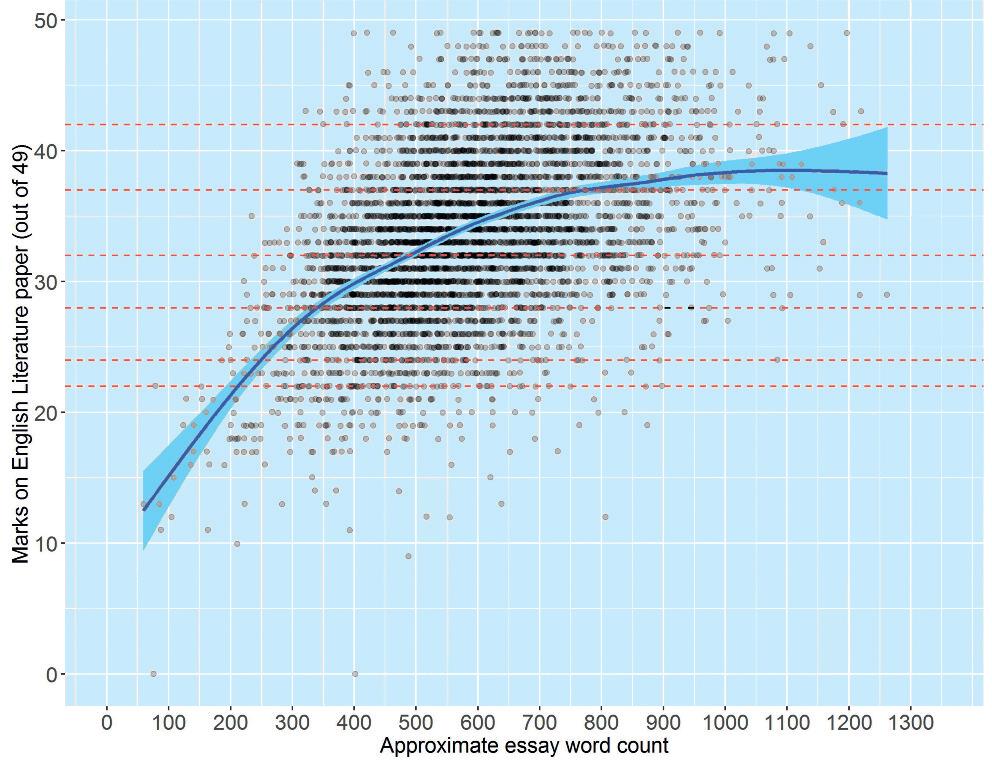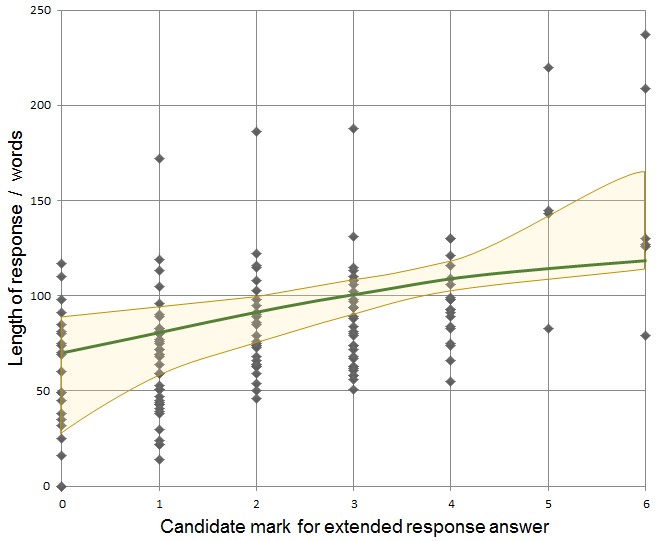How much should I write in a science exam? Does research and analysis provide an answer?
20 May 2019
As they prepare for the summer exam series, many students and teachers ask the questions “How much should I write to get an A*?” and “What should a level of response answer look like?” This blog looks at the most recent analysis of level of response questions from the 2018 exam series and tries to answer these questions.
Level of response questions from the 2018 exam series
The answers written by candidates to level of response questions in the summer 2018 exam series show that some candidates have used longer questions from legacy papers in their preparation.
However, in these older papers longer questions encouraged an essay-style approach where the number of marks often indicated how many points a candidate should cover.
These have been replaced by level of response questions in the GCSE Sciences (since 2012) and the reformed AS/A Level Science qualifications (since 2015).
Six-mark level of response questions emphasise the communication of scientific ideas and often require analysis, interpretation or evaluation of scientific ideas to make judgements and draw conclusions.
Rather than expecting candidates to write long essay answers, the extended response format encourages concise clear responses, as indicated by the answer lines available in the question paper booklets (12 lines at GCSE and 15 lines at AS/A level).
But how can candidates be assured that a clear, concise answer is better than a long, detailed essay-style response?
Relationship analysis of English and Geology candidates
Cambridge Assessment’s Research Division has used word recognition software to analyse whether there is a relationship between the length of response and final grade.
The essays of 5,000 OCR GCSE English Literature candidates were analysed (see below), and a relationship found between how much candidates wrote and their final grade. Rather than a simple linear correlation, three patterns were noted:
- There is an optimum answer length, and writing a longer answer does not guarantee a higher grade.
- Many of the highest achieving candidates write comparatively short answers.
- Candidates who make some attempt to write a relevant answer will gain some credit.

The relationship between essay length and achievement on a GCSE English Literature exam. (source: Benton 2017)
Although this research uses OCR GCSE English Literature candidate responses, the same patterns were seen in A Level English Literature essays, three-mark GCSE Biology extended response questions and GCSE Mathematics longer answer questions.
As a comparison, we analysed candidate answers to a six-mark level of response question in the 2018 AS Geology exam. This was the first series to include level of response questions, and the small entry size allowed us to carry out manual word counts.

The relationship between response length and candidate mark. AS Geology, June 2018.
The analysis of AS Geology candidate answers bore out the anecdotal observations of the senior examiners across the full OCR Science Suite in June 2018:
- The optimum length for an AS/A Level science response for a six-mark question was between 100 and 135 words at level 2 and level 3.
- Candidates gained most of their marks in the first half of their answer.
- Over long answers did not typically gain full marks as these candidates either contradicted themselves or introduced examples that were not relevant to their line of argument.
- Candidates who used an essay approach wrote long introductions that often used half the answer lines but contained no relevant and creditable content.
So where can candidates find advice on how much they should write in a science exam?
The simple answer is to use the available answer lines as a guide, and if you overrun then use the space immediately below the answer lines.
Avoid using a lengthy traditional essay style and aim for a concise scientific report style.
Use the candidate exemplar responses as guidance; these contain examiner commentaries explaining why individual responses gained the mark they did and what the candidate needed to do to progress to the next grade.
At GCSE there are exemplar resources for the June 2018 series and at A Level there are exemplars for both the sample assessment material and the full A Level series in 2017 and 2018. If you find that your practice answers are a page to two pages long then try a different writing style (for example, bullet points). Many good level 3 answers in the summer 2018 series were 90 –100 words long at GCSE and 125–135 words long at A Level.Further background to the work and details of the methods used to collect and analyse the data can be found in:
Benton, T. (2017). How much do I need to write to get top marks? Research Matters: A Cambridge Assessment Publication, 24, 37-40.
Stay connected
If you have any questions please submit your comments below or email them directly with your questions to either science@ocr.org.uk.
You can also sign up to receive email updates about any of our subjects or follow us on Twitter at @OCR_Science.
About the author

Chae Cruickshank - Subject Advisor – A Level and GCSE Sciences
Subject Advisor - Geology
Chae Cruickshank has worked for OCR since April 2014 and is the Subject Advisor for Geology and GCSE Physics. Chae spent a decade as a marine geophysicst before going into teaching. Prior to joining OCR Chae had been a classroom teacher in Norfolk and a senior field studies tutor on the Isle of Arran. As a graduate student Chae managed to trap his supervisor in a hut when a passing polar bear spotted some tasty leftovers in stew pot.